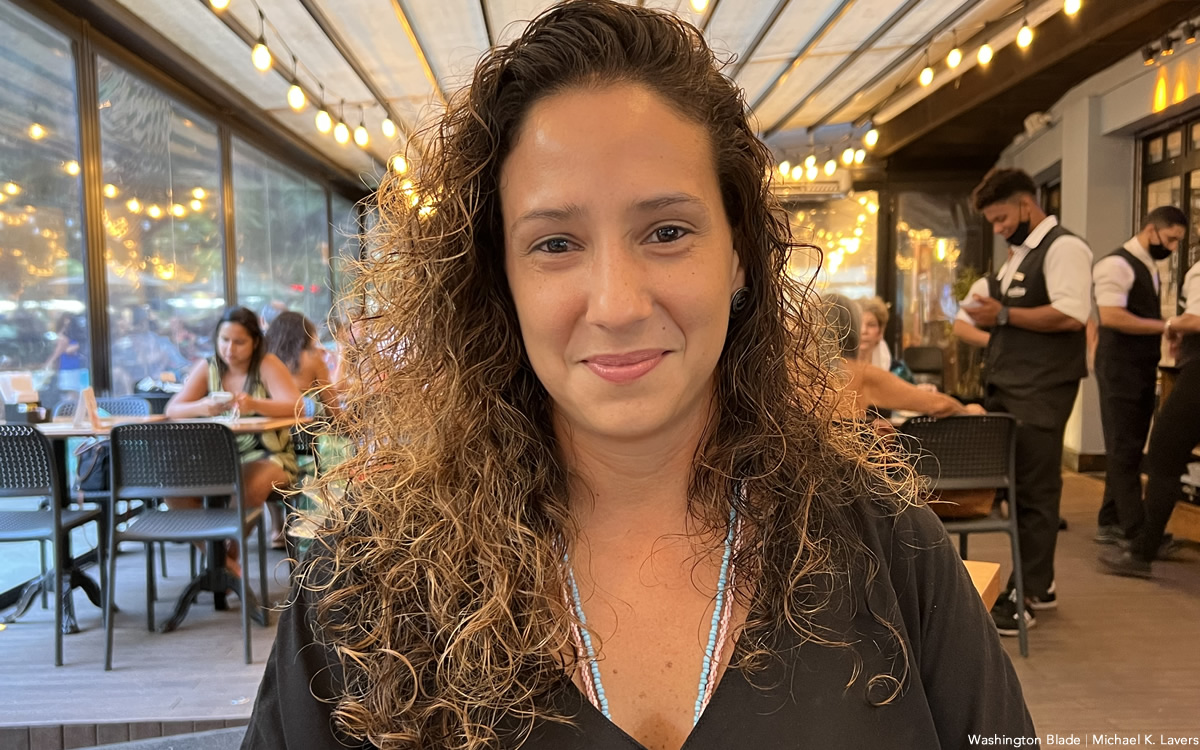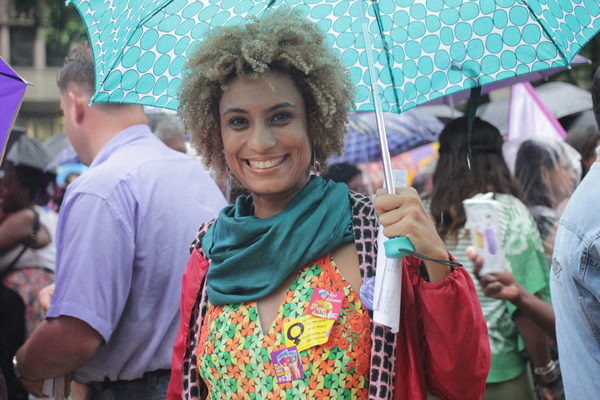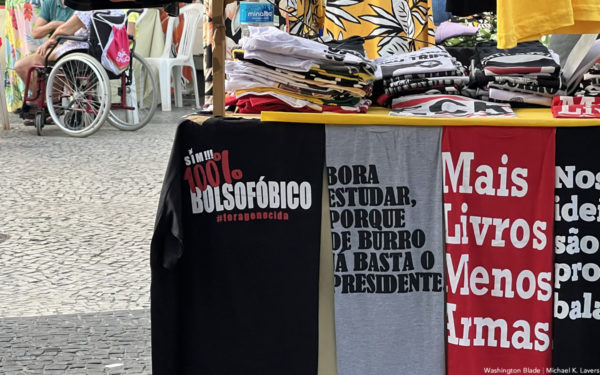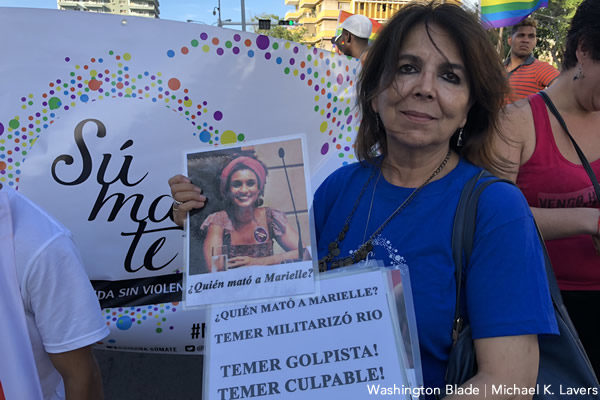World
Marielle Franco’s widow keeps her legacy alive
Mônica Benício elected to Rio de Janeiro Municipal Council in 2020

Editor’s note: International News Editor Michael K. Lavers was on assignment in Brazil from March 12-21.
RIO DE JANEIRO — March 14 marked four years since the murders of Rio de Janeiro Municipal Councilwoman Marielle Franco and her driver, Anderson Gomes, after they attended an event for Black women in the Brazilian city’s Lapa neighborhood. It remains very difficult for Franco’s widow, Mônica Benício, to discuss that day without becoming emotional.
“Before I start crying, I’ll just ask you to imagine what it is like to lose the love of your life,” said Benício on Saturday, speaking through her assistant who interpreted for her during an interview with the Washington Blade.
A tattoo of Franco’s face on Benício’s left forearm was visible throughout the interview that took place at a coffee shop near Largo de Machado in downtown Rio. A picture of Franco at a beach was also the screensaver on Benício’s smartphone.

Franco, a bisexual woman and single mother of African descent, grew up in Maré, a favela in the northern part of Rio that is close to its international airport.
Franco in 2003 began to work for now Congressman Marcelo Freixa, who is currently a member of the Brazilian Socialist Party, when he was a member of the Rio de Janeiro (State) Legislative Assembly. She coordinated its Defense of Human Rights and Citizenship Commission and worked for a number of local human rights organizations before she won a seat on the Rio Municipal Council in 2016 as a member of the leftist Socialism and Liberty Party.
Benício noted Franco received the fifth highest number of votes among the 51 candidates who ran for the Municipal Council in 2016. Only one other female candidate received more votes than Franco.
Franco, among other things, was an outspoken critic of police raids in Rio’s favelas that have left hundreds of people dead. She was a member of a Rio Municipal Council commission that sought to investigate them.
Franco four days before her murder described the Rio de Janeiro State Military Police’s 41st Battalion as “the death battalion” in response to the killings of three young men in two of the city’s favelas.
Authorities in 2019 arrested two former police officers in connection with Franco’s murder.
Benício noted the men remain in jail, but their trial has not begun.
“The struggle for justice to find out who ordered the murder and how high up they were indicates we are still far from knowing,” she said.
Ronnie Lessa, one of the main suspects, lived in the same large condominium complex in Rio’s exclusive Barra da Tijuca neighborhood in which President Jair Bolsonaro lives.
Bolsonaro, a former Brazilian Army captain who represented Rio in Congress for decades, was not president when Franco and Gomes were murdered.
Bolsonaro has strongly denied media reports that indicate Lessa visited his home before the killings. Benício referred to investigators’ claim the fact that Lessa and Bolsonaro were neighbors is “just a coincidence.”
Bolsonaro election ‘worst thing’ in Brazil for decades
Bolsonaro took office on Jan. 1, 2019. He defeated former São Paulo Mayor Fernando Haddad of former President Luiz Inácio Lula da Silva’s Workers’ Party in the second round of the country’s presidential election that took place on Oct. 28, 2018.
“It’s the worst thing that’s happened in the history of this country for decades,” said Benício.
Bolsonaro’s comments against LGBTQ Brazilians, women, indigenous people and other underrepresented groups have sparked widespread outrage. Sources in Rio, São Paulo and Salvador with whom the Blade spoke also noted Bolsonaro, who is a member of the Liberal Party, has sought to link COVID-19 vaccines to AIDS.
“It is important for us to understand that Jair Bolsonaro has been in Congress for 30 years and has made no contribution to society,” said Benício.
Benício noted Bolsonaro’s homophobic, transphobic, racist and misogynist rhetoric was “known” before he became president. Benício said it resonates with a segment of Brazilian society and has caused incidents of discrimination, harassment and violence based on race, sexual orientation, gender identity, class and other factors to increase.
“It is an absolutely despicable posture and incompatible with a posture of the president of the republic,” she said. “It does, however, resonates with sectors of society.”

Brazil’s presidential, vice presidential, congressional and state gubernatorial and legislative elections will take place on Oct. 2.
Early polls indicate da Silva is ahead of the highly unpopular Bolsonaro, although a run-off will take place if no presidential candidate receives a majority of the vote. Eduardo Leite, the governor of Rio Grande do Sul State and member of the center-left Brazilian Social Democratic Party who came out as gay last summer, is among those who are running for vice president.
Benício told the Blade that she is hopeful the election “will not be a favorable result” for Bolsonaro. Benício also acknowledged growing concerns that Bolsonaro may not accept the election results if he loses.
“Whether we can complete this electoral period within (the framework of) our democracy or if we have someone who has finally shown that he has no scruples is a real concern,” said Benício. “It doesn’t matter if he hands over that presidential sash.”
Benício elected to Rio Municipal Council in 2020
Franco’s family has created the Marielle Franco Institute that seeks to “inspire, connect and empower Black women, LGBTQIA+ people and others on the margins in order to continue moving the structures of society towards a fairer and more egalitarian world.”
Benício, who also grew up in Maré, was an architect before Franco and Gomes were killed. Benício in 2020 ran for the Rio Municipal Council as a member of the Socialism and Liberty Party, and won with nearly 23,000 votes.
Benício’s first term would have been Franco’s second.
“It was never in my personal life plan,” Benício told the Blade. “I was the partner of a lawmaker and my life was dedicated to architecture.”
Benício said the majority of her colleagues on the Municipal Council have treated her well, although some of them strongly disagree with her positions on LGBTQ rights and other issues that include support for efforts to address social and economic disparities in the city. Benício stressed she champions the same issues that Franco did.
“They already knew me as a defender of human rights,” said Benício, referring to her colleagues on the Municipal Council. “They already knew me as a feminist, a lesbian.”
Benício further stressed she remains committed to keeping Franco’s legacy alive.
“Seeing Marielle turn into a broad representative symbol of resistance, of hope, for me is the legacy,” said Benício. “Marielle’s life will not be in vain. Society will also not allow it.”

Ecuador
Justicia reconoce delito de odio en caso de bullying en Instituto Nacional Mejía de Ecuador
Johana B se suicidó el 11 de abril de 2023

A casi tres años del suicidio de Johana B., quien estudió en el Instituto Nacional Mejía, colegio emblemático de Quito, el Tribunal de la Corte Nacional de Justicia ratificó la condena para el alumno responsable del acoso escolar que la llevó a quitarse la vida.
Según información de la Fiscalía, el fallo de última instancia deja en firme la condena de cuatro años de internamiento en un centro para adolescentes infractores, en una audiencia de casación pedida por la defensa del agresor, tres meses antes de que prescriba el caso.
Con la sentencia, este caso es uno de los primeros en el país en reconocer actos de odio por violencia de género, delito tipificado en el artículo 177 del Código Orgánico Penal Integral (COIP).
El suicidio de Johana B. ocurrió el 11 abril de 2023 y fue consecuencia del acoso escolar por estereotipos de género que enfrentó la estudiante por parte de su agresor, quien constantemente la insultaba y agredía por su forma de vestir, llevar el cabello corto o practicar actividades que hace años se consideraban exclusivamente para hombres, como ser mando de la Banda de Paz en el Instituto Nacional Mejía.
Desde la muerte de Johana, su familia buscaba justicia. Su padre, José, en una entrevista concedida a edición cientonce para la investigación periodística Los suicidios que quedan en el clóset a causa de la omisión estatal afirmó que su hija era acosada por su compañero y otres estudiantes con apodos como “marimacha”, lo que también fue corroborado en los testimonios recogidos por la Unidad de Justicia Juvenil No. 4 de la Fiscalía.
Los resultados de la autopsia psicológica y del examen antropológico realizados tras la muerte de Johana confirmaron las versiones de sus compañeras y docentes: que su agresor la acosó de manera sistemática durante dos años. Los empujones, jalones de cabello o burlas, incluso por su situación económica, eran constantes en el aula de clase.
La violencia que recibió Johana escaló cuando su compañero le dio un codazo en la espalda ocasionándole una lesión que le imposibilitó caminar y asistir a clases.
Días después del hecho, la adolescente se quitó la vida en su casa, tras escuchar que la madre del agresor se negó a pagar la mitad del valor de una tomografía para determinar la lesión en su espalda, tal como lo había acordado previamente con sus padres y frente al personal del DECE (Departamento de Consejería Estudiantil del colegio), según versiones de su familia y la Fiscalía.
#AFONDO | Johana se suicidó el 11 de abril de 2023, tras ser víctima de acoso escolar por no cumplir con estereotipos femeninos 😢.
Dos semanas antes, uno de sus compañeros le dio un codazo en la espalda, ocasionándole una lesión que le imposibilitó caminar 🧵 pic.twitter.com/bXKUs9YYOm
— EdicionCientonce (@EdCientonce) September 3, 2025
“Era una chica linda, fuerte, alegre. Siempre nos llevamos muy bien, hemos compartido todo. Nos dejó muchos recuerdos y todos nos sentimos tristes; siempre estamos pensando en ella. Es un vacío tan grande aquí, en este lugar”, expresó José a Edición Cientonce el año pasado.
Para la fiscal del caso y de la Unidad de Justicia Juvenil de la Fiscalía, Martha Reino, el suicidio de la adolescente fue un agravante que se contempló durante la audiencia de juzgamiento de marzo de 2024, según explicó a este medio el año pasado. Desde entonces, la familia del agresor presentó un recurso de casación en la Corte Nacional de Justicia, que provocó la dilatación del proceso.
En el fallo de última instancia, el Tribunal también dispuso que el agresor pague $3.000 a la familia de Johana B. como reparación integral. Además, el adolescente deberá recibir medidas socioeducativas, de acuerdo al artículo 385 del Código Orgánico de la Niñez y Adolescencia, señala la Fiscalía.
El caso de Johana también destapó las omisiones y negligencias del personal del DECE y docentes del Instituto Nacional Mejía. En la etapa de instrucción fiscal se comprobó que no se aplicaron los protocolos respectivos para proteger a la víctima.
De hecho, la Fiscalía conoció el caso a raíz de la denuncia que presentó su padre, José, y no por el DECE, aseguró la fiscal el año pasado a Edición Cientonce.
Pese a estas omisiones presentadas en el proceso, el fallo de última instancia sólo ratificó la condena para el estudiante.
Africa
LGBTQ groups question US health agreements with African countries
Community could face further exclusion, government-sanctioned discrimination

Some queer rights organizations have expressed concern that health agreements between the U.S. and more than a dozen African countries will open the door to further exclusion and government-sanctioned discrimination.
The Trump-Vance administration since December has signed five-year agreements with Kenya, Uganda, and other nations that are worth a total of $1.6 billion.
Kenyan and Ugandan advocacy groups note the U.S. funding shift from NGO-led to a government-to-government model poses serious risks to LGBTQ people and other vulnerable populations in accessing healthcare due to existing discrimination based on sexual orientation.
Uganda Minority Shelters Consortium, Let’s Walk Uganda, the Kenya Human Rights Commission, and the Center for Minority Rights and Strategic Litigation note the agreements’ silence on vulnerable populations in accessing health care threatens their safety, privacy, and confidentiality.
“Many LGBTQ persons previously accessed HIV prevention and treatment, sexual and reproductive health services, mental health support, and psychosocial care through specialized clinics supported by NGOs and partners such as USAID (the U.S. Agency for International Development) or PEPFAR,” Let’s Walk Uganda Executive Director Edward Mutebi told Washington Blade.
He noted such specialized clinics, including the Let’s Walk Medical Center, are trusted facilities for providing stigma-free services by health workers who are sensitized to queer issues.
“Under this new model that sidelines NGOs and Drop-in Centers (DICs), there is a high-risk of these populations being forced into public health facilities where stigma, discrimination, and fear of exposure are prevalent to discourage our community members from seeking care altogether, leading to late testing and treatment,” Mutebi said. “For LGBTQ persons already living under criminalization and heightened surveillance, the loss of community-based service delivery is not just an access issue; it is a full-blown safety issue.”
Uganda Minority Shelters Consortium Coordinator John Grace said it is “deeply troubling” for the Trump-Vance administration to sideline NGOs, which he maintains have been “critical lifelines” for marginalized communities through their specialized clinics funded by donors like the Global Fund and USAID.
USAID officially shut down on July 1, 2025, after the White House dismantled it.
Grace notes the government-to-government funding framework will impact clinics that specifically serve the LGBTQ community, noting their patients will have to turn to public systems that remain inaccessible or hostile to them.
“UMSC is concerned that the Ugandan government, under this new arrangement, may lack both the political will and institutional safeguards to equitably serve these populations,” Grace said. “Without civil society participation, there is a real danger of invisibility and neglect.”
Grace also said the absence of accountability mechanisms or civil society oversight in the U.S. agreement, which Uganda signed on Dec. 10, would increase state-led discrimination in allocating health resources.
Center for Minority Rights and Strategic Litigation Legal Manager Michael Kioko notes the U.S. agreement with Kenya, signed on Dec. 4, will help sustain the country’s health sector, but it has a non-binding provision that allows Washington to withdraw or withhold the funding at any time without legal consequences. He said it could affect key health institutions’ long-term planning for specialized facilities for targeted populations whose independent operations are at stake from NGOS the new agreement sidelines.
“The agreement does not provide any assurance that so-called non-core services, such as PrEP, PEP, condoms, lubricants, targeted HIV testing, and STI prevention will be funded, especially given the Trump administration’s known opposition to funding these services for key populations,” Kioko said.
He adds the agreement’s exclusionary structure could further impact NGO-run clinics for key populations that have already closed or scaled down due to loss of the U.S. funding last year, thus reversing hard-won gains in HIV prevention and treatment.
“The socio-political implications are also dire,” Kioko said. “The agreement could be weaponized to incite discrimination and other LGBTQ-related health issues by anti-LGBTQ voices in the parliament who had called for the re-authorization of the U.S. funding (PEPFAR) funding in 2024, as a political mileage in the campaign trail.”
Even as the agreement fails to safeguard specialized facilities for key populations, the Kenya Human Rights Commission states continued access to healthcare services in public facilities will depend on the government’s commitment to maintain confidentiality, stigma-sensitive care, and targeted outreach mechanisms.
“The agreement requires compliance with applicable U.S. laws and foreign assistance policies, including restrictions such as the Helms Amendment on abortion funding,” the Kenya Human Rights Commission said in response to the Blade. “More broadly, funded activities must align with U.S. executive policy directives in force at the time. In the current U.S. context, where executive actions have narrowed gender recognition and reduced certain transgender protections, there is a foreseeable risk that funding priorities may shift.”
Just seven days after Kenya and the U.S. signed the agreement, the country’s High Court on Dec. 11 suspended its implementation after two petitioners challenged its legality on grounds that it was negotiated in secrecy, lacks proper parliamentary approval, and violates Kenyans’ data privacy when their medical information is shared with America.
The agreement the U.S. and Uganda signed has not been challenged.
European Union
European Parliament resolution backs ‘full recognition of trans women as women’
Non-binding document outlines UN Commission on the Status of Women priorities

The European Parliament on Feb. 11 adopted a transgender-inclusive resolution ahead of next month’s U.N. Commission on the Status of Women meeting.
The resolution, which details the European Union’s priorities ahead of the meeting, specifically calls for “the full recognition of trans women as women.”
“Their inclusion is essential for the effectiveness of any gender-equality and anti-violence policies; call for recognition of and equal access for trans women to protection and support services,” reads the resolution that Erin in the Morning details.
The resolution, which is non-binding, passed by a 340-141 vote margin. Sixty-eight MPs abstained.
The commission will meet in New York from March 10-21.
A sweeping executive order that President Donald Trump signed shortly after he took office for a second time on Jan. 20, 2025, said the federal government’s “official policy” is “there are only two genders, male and female.” The Trump-Vance administration has withdrawn the U.S. from the U.N. LGBTI Core Group, a group of U.N. member states that have pledged to support LGBTQ and intersex rights, and dozens of other U.N. entities.
-

 Massachusetts5 days ago
Massachusetts5 days agoEXCLUSIVE: Markey says transgender rights fight is ‘next frontier’
-

 Opinions4 days ago
Opinions4 days agoGay Treasury Secretary’s silence on LGBTQ issues shows he is scum
-

 New York4 days ago
New York4 days agoLawsuit to restore Stonewall Pride flag filed
-

 U.S. Military/Pentagon4 days ago
U.S. Military/Pentagon4 days ago4th Circuit rules against discharged service members with HIV














